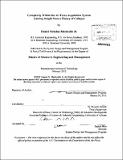Complexity within the Air Force acquisition system gaining insight from a theory of collapse
Author(s)
Marticello, Daniel Nicholas, Jr
DownloadFull printable version (17.54Mb)
Other Contributors
System Design and Management Program.
Advisor
Ricardo Valerdi.
Terms of use
Metadata
Show full item recordAbstract
Joseph Tainter's theory of societal collapse is applied in an examination of the U.S. Air Force's aircraft acquisition system in order to gain insight into the enterprise's lagging performance. Theories of collapse at both the societal level and the organizational level are reviewed. Tainter's interrelationship between increasing system complexity and diminishing marginal returns is highlighted as especially relevant to the performance of the Air Force aircraft acquisition enterprise. Using Tainter's theory as a framework, evidence is gathered leading to the conclusions that the Air Force aircraft acquisition enterprise is highly complex and as a result is experiencing diminishing marginal returns. Tainter's framework is then also used to explain why past attempts to reform the enterprise have fallen short of their goals. Previous reform efforts, in the form of reorganizations and senior leader initiatives, have been ineffectual beyond the short term because they fail to reduce the underlying level of complexity within the enterprise. The use of workarounds by stakeholders within the enterprise are shown to be efforts to increase marginal returns and avoid overcomplexity. The primary implication of viewing the Air Force aircraft acquisition enterprise through the lens of Tainter's theory of collapse is that in order to be effective, any effort undertaken to improve the performance of the enterprise must reduce the overall level of complexity within the system. Additional insights include the use of current workarounds as leading indicators of complexity or overly burdensome processes. Lastly, senior acquisition leaders should be prepared should a collapse of the enterprise occur. A vision of a much less complex enterprise should be advocated.
Description
Thesis (S.M. in Engineering and Management)--Massachusetts Institute of Technology, Engineering Systems Division, 2012. Cataloged from PDF version of thesis. Includes bibliographical references (p. 122-129).
Date issued
2012Department
System Design and Management Program.; Massachusetts Institute of Technology. Engineering Systems DivisionPublisher
Massachusetts Institute of Technology
Keywords
Engineering Systems Division., System Design and Management Program.